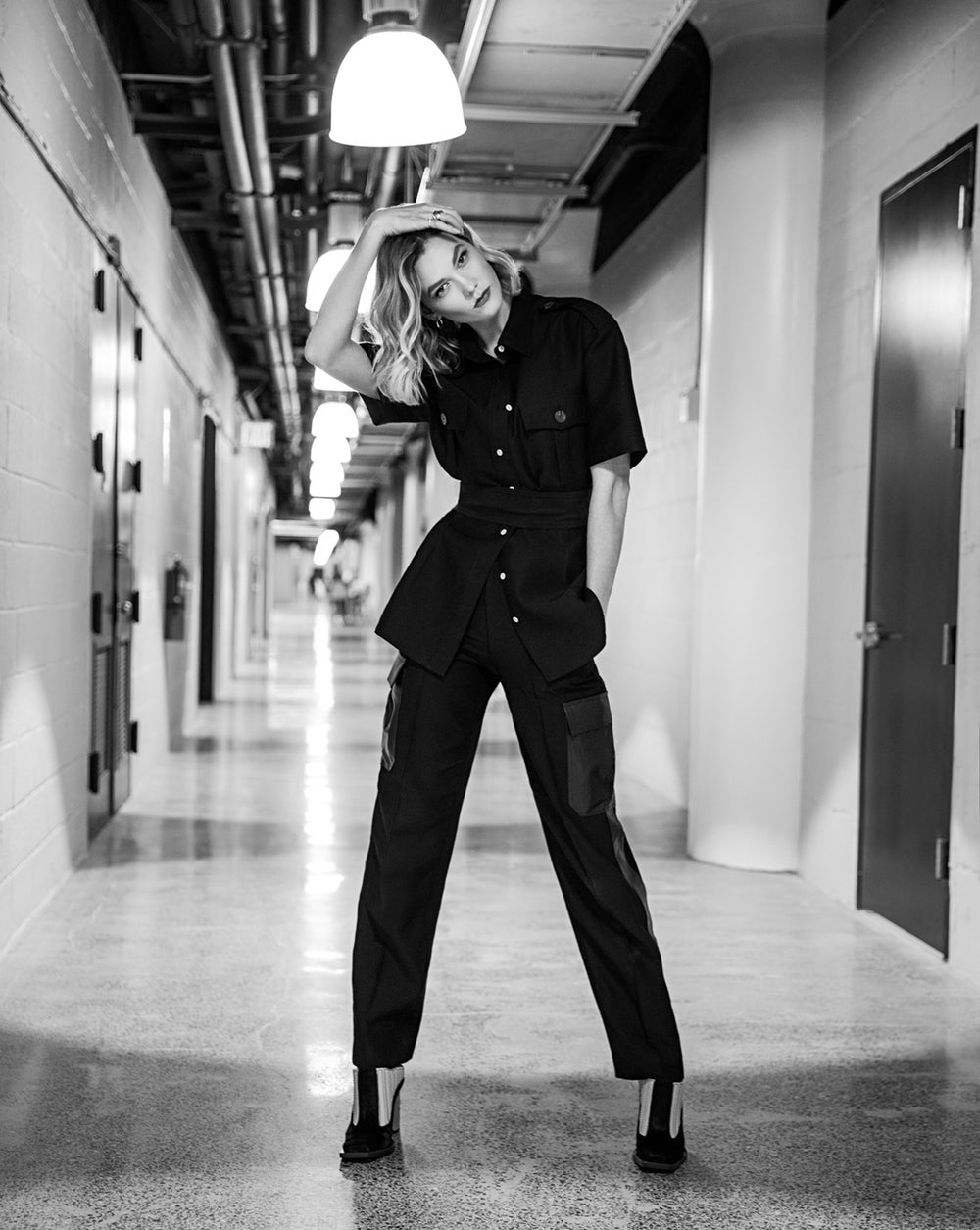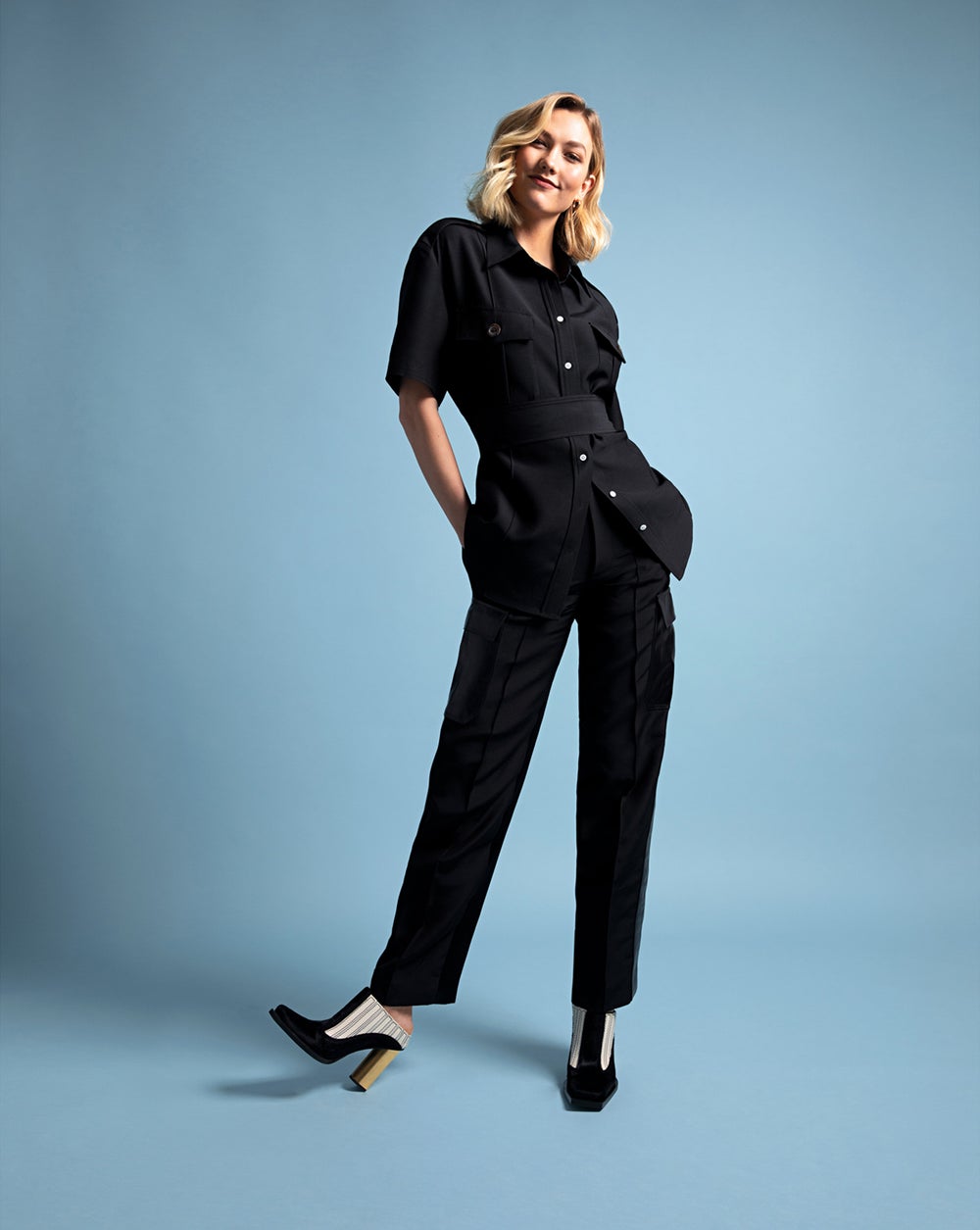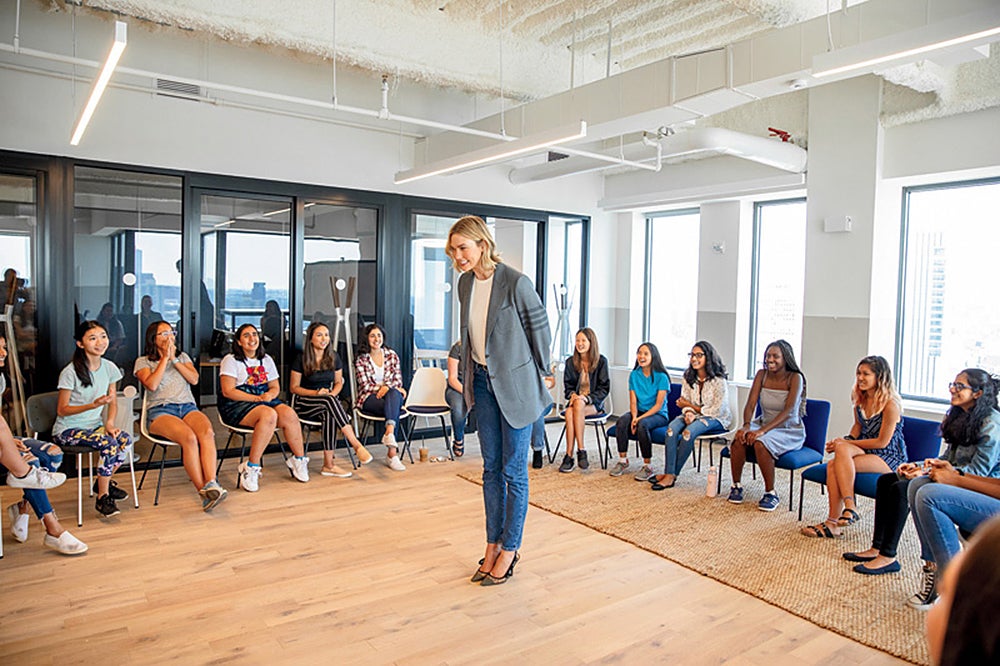The Project Runway host built a coding school, Kode With Klossy, to inspire a generation of tech-savvy women. But her real mission, she says, is much broader.
13 min read
This story appears in the October 2019 issue of Entrepreneur. Subscribe »
The view is stunning up here, from the 34th floor of this downtown Manhattan office building. Outside the floor-to-ceiling windows, the day is bright and clear. But the 24 teenage girls occupying the space are over it. Their noses are buried in MacBooks, while a soundtrack of Disney hits plays in the background. There’s work to be done, after all: They’re students at a nonprofit coding camp called Kode With Klossy, and today’s assignment is to design and code an online photo gallery.
They’re so focused on the task, in fact, that they don’t notice when the camp’s creator and very famous namesake walks in.
“Hey, guys,” says supermodel, Project Runway host, and coding enthusiast Karlie Kloss, as she gives the students a friendly wave. The girls seem a bit too stunned to react. Eyes widen as they glance around at each other, quietly nodding with shared enthusiasm. But before they can do much of anything else, the 27-year-old Kloss is checking out their work, bringing her six-foot-two-inch frame to a squat so she can be eye level with her students and their screens. For the next 90 minutes, she asks questions about their code and their plans for the future — though conversation occasionally veers off to Harry Potter and chocolate chip cookies.
If it’s all a little surreal inside this room, it can look even more so from the outside. Kode With Klossy operates in 16 cities and this year alone gave almost 1,000 young women the (free) opportunity to learn a critical skill. It has attracted a wide range of support, though also the inevitable skepticism. Supermodels, after all, aren’t supposed to code.
Related: Karlie Kloss Looks to These Female Founders for Inspiration
Kloss has heard it before. And she has a straightforward response. “There are a lot of misconceptions about being a model, and how that directly correlates to your intellect,” she says. “Yes, I’m a model, yes, I’m a woman, and, yes, I’m interested in these areas. And I think a lot of other young women are interested in these areas, too, and they deserve the opportunity to learn about them and decide for themselves if they belong or not.”
Kloss is careful to never claim expertise in the world of computer science. She’s an enthusiast. She can code, but she considers herself a perpetual student of the craft — and a person not defined by others’ expectations. That, she hopes, is the sensibility her students will come away with. More than attaining any level of coding experience, she wants Kode With Klossy’s attendees to appreciate the power of curiosity and the willingness to ask questions. She owes her career to this instinct, she says. And she’ll continue to use it as her professional life evolves.
As Kloss makes her rounds at the camp, one young coder sings the praises of the instructors but sheepishly apologizes for asking them too many questions. “No!” Kloss says emphatically. “Do not apologize. That’s what they’re here for. You should always ask your questions.”

Image Credit: Jake Chessum
Kloss grew up in St. Louis with her mom, dad, and three sisters. At 13, she participated in a local charity fashion show and was, as they say, discovered. By 15, she was walking the runway for Calvin Klein. In the years that followed, Kloss became one of fashion’s favorite faces, gracing countless runways and magazine covers. (To date, she’s covered various editions of Vogue 40 times.)
But by 2014, she wanted more. “I was 21, a bit of a veteran in fashion — it’s like dog years — and I just wasn’t feeling challenged,” Kloss says. “I was so in awe of what was happening in tech but a bit frustrated that I didn’t understand it. Why do certain people know how to scale businesses and ideas and problem-solving? What is it that certain people — primarily men, and primarily highly intellectual men, or at least men who are perceived to be super smart — are privy to that the rest of the world isn’t?”
To answer those questions, she signed up for a two-week coding boot camp at the Flatiron School in New York. Kloss was captivated by the experience. “The way I learned code was very real-world applicable,” she says. “Being able to understand the building blocks of [technology]? It turns the lights on. It turned the lights on for me.”
In the months that followed, she kept studying. She struck up a friendship with Flatiron School cofounder Avi Flombaum, who helped her along. And as her fluency in code continued to grow, she started to think about how many other women could benefit from the same perspective-changing experience.
“I had an audience of young women paying attention to me on social media and in my career, and I wanted to connect them to opportunities that could really open their minds and open doors in their lives,” she says. “It’s not only a responsibility but a real privilege to be able to point someone in a direction that could be valuable to them.”
Related: In Pitching Your Business, Take Every ‘No’ As a ‘Not Now,’ Says This Founder
But how? Kloss decided to start with what she knew. The summer after she learned to code, she partnered with the Flatiron School to underwrite 21 boot camp spots for young women. She publicized the opportunity on her social media channels and was surprised by the response. Thousands of applications came in.
This got her thinking about what it would take to reach more women. The first step, it seemed, was to build something herself — something she could eventually scale nationwide. “I had no idea how, or even the intention, to build a nonprofit or anything in this realm,” she says. “I had no idea what I was doing.”
But then again, she didn’t know anything about code until she threw herself into the boot camp. “It’s just been about figuring it out as you go,” she says.

Image Credit: Jake Chessum
Kloss calls her camp “my nights, my weekends, my day job, my baby.” But at the very beginning, it was just her puzzle. She had no experience building something like this, but she did have an enviable professional network. She counts Diane Von Furstenberg and Anna Wintour as mentors, and has longstanding business relationships with brands including Adidas and Carolina Herrera. So she made some calls and got some direction.
“Like with any business, you focus on an area you understand,” she says. “And as you grow, identify who else out there is doing good work, and figure out how you can align to better accomplish your goals.”
That became her approach. She had a vision; now she needed to piece together the right operational elements. She assembled a team of what would become five full-time staffers, and at first, they simply expanded their partnership with the Flatiron School. In 2016, Kode With Klossy launched as a stand-alone nonprofit, hosting two-week camps for girls ages 13 to 18 in New York, St. Louis, and Los Angeles. In 2017, the program expanded to 11 cities. By 2019, it was in 16 locales.
As Kloss and her tiny team have taken on more and more of the logistics and back-end operations, they’ve required additional partners. The Turing School of Software and Design now helps craft a technical curriculum. Teach for America has also signed on, tapping into its network of teachers, and, with an assist from Kode With Klossy, is teaching them to code, and then training them to teach code.
Related: Model and Entrepreneur Karlie Kloss Shares the Importance of Always Learning
Students — which the program calls “scholars” — apply for a coveted, completely free spot at one of the camps, which aims to select students who otherwise wouldn’t have easy access to these kinds of opportunities. Those accepted spend two weeks learning code, attending workshops on topics like career paths and financial literacy, and building various projects until “Demo Day,” when they pitch their completed websites or apps to their teachers, fellow students, and parents. Past projects have included an app that connects students with peer tutors and another that helps users locate public gender-neutral bathrooms.
As the guts of the program have become increasingly well-oiled, Kloss has relied on her existing network to make Kode With Klossy’s offerings as robust as possible.
As a brand ambassador and face of Estée Lauder makeup, for example, this summer Kloss arranged for the cosmetic giant’s female engineers to speak to scholars, and created an exercise that allowed them to explore the back-end design of a new digital campaign for the corporation. The partnership provided summer internships at Estée Lauder for two Kode With Klossy alumnae.
Kloss also aligned with Away, the travel startup, which she’s invested in. (Her growing portfolio includes the female-founded brands Lola, which makes feminine products, and SkinTe, a collagen-infused tea.) In 2018, Away launched an exclusive collection of luggage in new colors, designed in collaboration with Kode With Klossy. Sales benefited the coding organization.
Kloss herself isn’t able to visit every camp — she tried at first, but the endeavor has simply grown too big. So she appears where she can and makes sure to FaceTime in with the rest. As she does, and as she’s talked to the girls who attend, she’s come to realize that her program is providing something that she herself lacked as a child.
“I wanted to become a teacher or a doctor, because that’s what I saw: My dad’s an ER doctor, and I had amazing teachers at my public school who really helped me love learning,” she says. “But those were the only avenues forward I saw. So now, for example, we have one scholar who’s a really gifted artist, and when she tells me she wants to go into game design, I’m like: ‘Yes! That is a great application of both of your passions.’ ”
For Kloss as well as her young scholars, coding boot camps become a portal to a bigger world. For the supermodel, it was an awakening that led her to create one of her own. And now, for the students at that camp, it’s a beginning that can lead anywhere.

Image Credit: Kode with Klossy
In spring 2017, Valeria Torres-Olivares was wrapping up her junior year of high school in Princeton, N.J. She’d taken a couple of computer science classes and loved what she learned but found the experience to be isolating.
“I was one of the only girls in my classroom, and I was the only Latina in any of the computer science classes at my school,” she says. “I felt almost unqualified to ask questions, like I should be able to figure them out for myself. That can spiral into a lot of self-doubt.”
Related: 5 Things I’ve Learned Teaching Hundreds of People How to Code
So she decided to apply to be a Kode With Klossy scholar and encouraged her little sister Kyara, who was 13 at the time, to do the same. (“I wanted her to be exposed to code, but in a different environment,” she says.) They recorded a joint video application and were accepted. The experience changed everything.
“I had never been in an all-female STEM environment before, and I expected some sort of weird competitive vibe to be happening,” she admits. “But it was one of the best learning environments I’d ever been in. My sister and I both fell in love with how collaborative it was. No one was afraid to ask what might be labeled as ‘dumb’ questions.”
Torres-Olivares went all in after that. She spent the next two summers with Kode With Klossy — once more as an attendee, and then as a paid instructor’s assistant. And like Kloss, she immediately knew she wanted to share her knowledge.
With her little sister, Torres-Olivares approached her local library and offered to host and teach free coding classes for kids. That kicked off a new organization, Code Equal, which she launched in Princeton in 2017. It has since served more than 200 students and held workshops at Fordham and Rutgers universities. This year, Code Equal will launch classes in Detroit and Omaha.
“Kode With Klossy has an amazing network of students and instructors, and we have massive group chats where people are always supporting each other,” says Torres-Olivares, who is now a sophomore at Princeton University, where she’s studying computer science with plans to create a custom major that blends the craft of code with public policy. “Because of that, we’ve been able to expand our mission.”
For Kloss, these are the stories that prove the organization’s success — not because former scholars are choosing to commit to code, but because they’re choosing to create their own path. Next, she wants to dedicate more resources to empowering that budding alumnae network and has her eye on programming for girls younger than 13 and for women older than 18.
“In the grand scheme of things, a Kode With Klossy camp is a short two weeks,” Kloss says. “But our scholars take it and run with it. We’re at a point in this organization where we’ve only just scratched the surface, and it’s time to look at what’s working, and innovate and scale. But being able to see impact in even one person? It’s so much bigger than what I ever imagined.”
Check out more stories from our October/November issue’s list of 100 Powerful Women.
https://www.entrepreneur.com/article/339381

